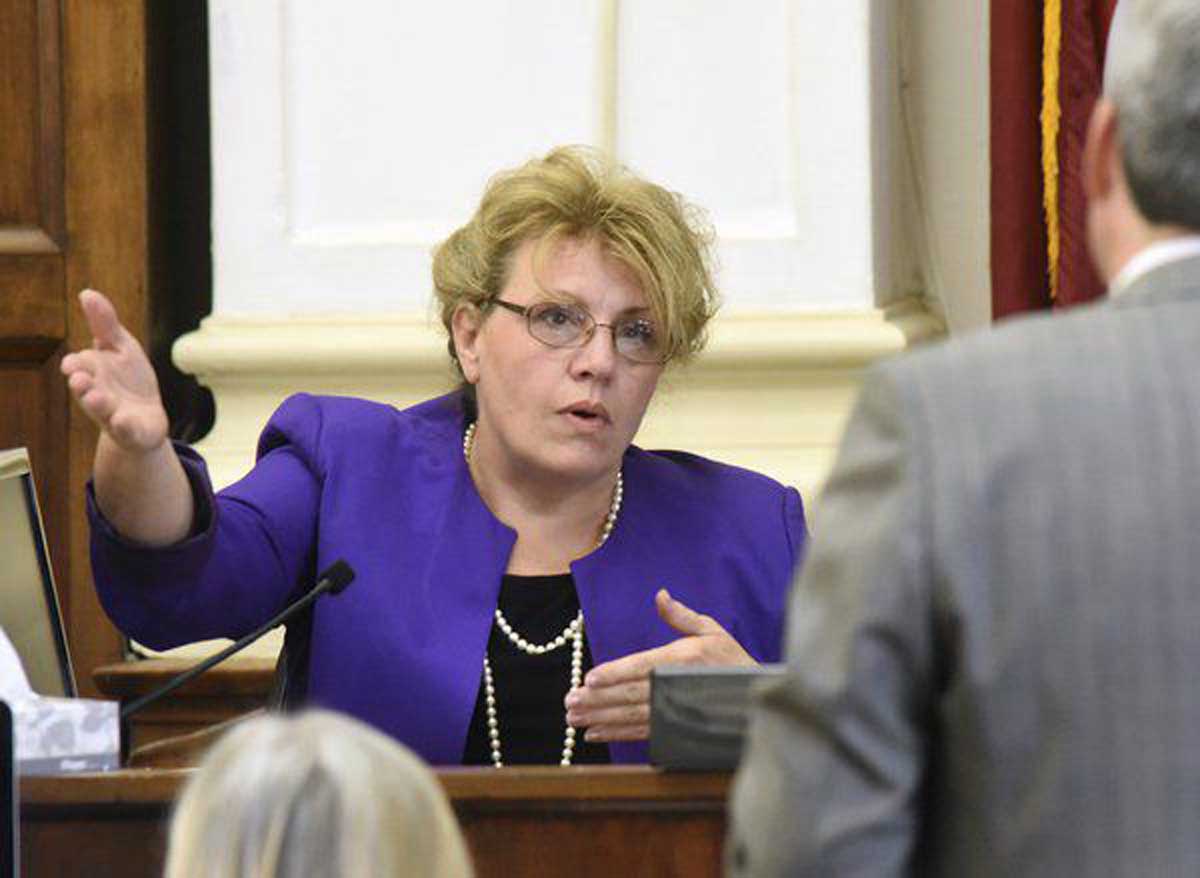Officials challenged on need for new tax
Published 2:38 pm Wednesday, February 22, 2017

- Whitfield County Schools Superintendent Judy Gilreath and Dalton Public Schools Superintendent Jim Hawkins give a presentation on a proposed Education Special Purpose Local Option Sales Tax (ESPLOST) during the League of Women Voters meeting.
DALTON, Ga. — Schools are vital to a community’s success. On that, there was general agreement Tuesday at a lunch hosted by the League of Women Voters of the Dalton Area.
But just what would a proposed Education Special Purpose Local Option Sales Tax (ESPLOST) do to improve local schools? That was a point of contention.
Trending
Whitfield County Schools Superintendent Judy Gilreath and Dalton Public Schools Superintendent Jim Hawkins opened the forum with a presentation on exactly what the ESPLOST would do if approved by voters during a March 21 special election.
Gilreath noted that if the ESPLOST passes it will be the county’s fifth. Whitfield County has had an ESPLOST in place for all but one of the last 20 years.
The current five-year ESPLOST that is split between the two local school systems based on enrollment numbers expires on Dec. 31 of this year and is expected to collect $81 million, which has been far below projections, according to numbers released by Dalton Public Schools.
The new five-year ESPLOST, if approved by voters, would begin on Jan. 1, 2018, and would be expected to collect $98 million, with Whitfield County Schools receiving $61 million and Dalton Public Schools $37 million. Because enrollment in Dalton schools has grown and enrollment in county schools has plateaued and is even trending downward, Dalton Public Schools would see its percentage of the tax rise from 34.62 percent to 37.7 percent if the tax is approved by voters.
Whitfield County Schools’ top priorities for its share of the ESPLOST are replacing North Whitfield Middle School and Valley Point Middle School, which were built more than 50 years ago as high schools, with two new schools that would be built on the same campuses.
Dalton Public Schools’ top priority is “adding to, renovating, repairing, improving, equipping and furnishing existing school buildings or other buildings or facilities useful or desirable in connection therewith, including, but not limited to Brookwood School, City Park School, Roan School and Dalton High School.”
Trending
Hawkins said the proposed work is similar to what has been done at other schools in the system. He said putting in LED lights and replacing aging heating and air conditioning units saves energy and reduces the costs of operating schools.
Hawkins noted that some have questioned the need for an expansion of the Dalton High gym, but he said it isn’t just used for basketball games but also for physical education.
Dalton attorney Steve Farrow, who served in the state Senate when the Legislature created the ESPLOST, said lawmakers wanted to give school systems a tool to fund projects that are needed, not something that would let them check off a wish list. He asked what the school systems would do if the ESPLOST fails.
Gilreath said Valley Point Middle would have to be replaced.
“We’ve got sewage backing up out there. We’ve got walls that are separating,” she said.
Hawkins said the HVAC (heating, ventilation and air conditioning) replacement and roof repairs at Brookwood and City Park schools will have to be done.
Mike Maret and Chris Shiflett of the Citizens for Education Taskforce, a group of local residents who are supporting passage of the ESPLOST, spoke in favor of the ESPLOST.
“I’m as anti-tax as you can be. I’m as conservative as you can be,” said Shiflett. “But the sales tax is the fairest way to fund these projects, and they have to be done.”
Maret said as a real estate agent he talks to many people looking at making Dalton and Whitfield County their home and the first thing they ask about is the schools.
But former Dalton mayor David Pennington spoke against the tax.
“I’m not against all ESPLOSTs, but I am against this one,” he said.
Pennington said that just 37 percent of Dalton Public Schools third-graders are reading on or above grade level, and just 43 percent of its high school graduates are ranked “college and career ready” by the state.
He urged voters not to support an ESPLOST until the school systems develop plans to improve their test scores and can explain how the projects that would be funded by the ESPLOST would help make those plans work.
But Gilreath said Dalton and Whitfield schools differ from surrounding districts in having higher percentages of low-income students and students who are English language learners. She said that if you follow their students through the years after they come into local schools their test scores do show improvement.
Hawkins said he believes Dalton students are learning but its failing to show up on state-mandated tests. He said the faculty and staff in Dalton schools are working on helping students translate what they have learned into better scores on those tests.
He also said that will be easier to do if the ESPLOST passes and they are able to make needed renovations at the schools.
One audience member asked what is being done to help students with math. Hawkins said since the recession ended a few years ago the Dalton school system has been beefing up math training by adding math coaches and has a plan in place to continue to improve math scores.





